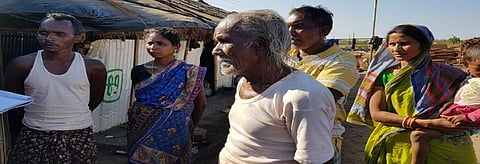

The famous Simlipal Tiger Reserve (STR) in Odisha is in the horns of a dilemma familiar to all protected areas in the world: whose side should it take? The tigers for which it is known or the tribespeople who have lived there for generations, sharing space with the wild animals.
The quandary came to the fore on January 23, 2019, when a fire swept through the village of Sialinai, a fringe area of the STR, leaving at least 16 families of the Khadia tribal community homeless and injuring 16 people, one of them critically.
The oustees are from Ramjodi, a village in the buffer area of STR, who were forcibly shifted to Sialinai on June 10, 2018. The relocation process was carried out by violating all relocation norms under the Forest Rights Act (FRA), 2006. The tribals were deprived of their land and livelihood opportunities due to the move.
“We were asked by the forest department to leave our birth place Ramjodi as it could get submerged by the Deo dam on the Deo river, which was untrue. The forest department kept asking us to vacate the village otherwise we would not get any compensation and other benefits. We had no option but to leave the place and settle in temporary shanties erected for us,” says Pitambar Nayak, a village elder.
Sukrumuni Dehury, a village resident, says, “We lost everything — our livelihood, our place of worship, our source of livelihood and were made to live in very low-roofed houses with tin walls. These huts can’t protect us from the cold, heat or rains. The thatched roofs are so low that we live under constant fear that our houses may catch fire any time and the worst happened on the night of January 23. As the tin walls can’t protect us from the prevailing cold conditions, we have to sleep around the hearth and such a mishap was imminent.”
According to land rights activist Aurobindo Rout, though it is a mishap, but it could have been avoided had the forest department followed the relocation norms and provided permanent houses to the village residents at the new place before relocating them. “The department completed its job by handing over a few thousands rupees as compensation. It is good that the tehsildar and the BDO reached the place immediately to provide food and other support. But, it is high time the officials offered permanent structures to the residents at the earliest,” he added.
Rout added that the forest department claims the villager residents had approached them for a voluntary relocation. But the claim of the department seems baseless as all the tribals allege that the department had forced them to vacate the place on various pretexts and by terrorising them.
Tanuja Mishra, a community development practitioner in the area, alleged that the forest department terrorised the villagers saying that their village (Ramjodi) will get submerged under the Deo dam, which is under-construction. But, in reality, the dam project will have no impact on this village. The village is dominated by members of the Khadia tribe, who used to sell a quintal of honey every year and get a good profit by selling siali fibres and leaf-plates, have been reduced to daily wagers.
Chitta Ranjan Pani, a forest rights activist, says the real reason for the ousting of the tribals is the wild animals of the STR. “The forest officials have been vacating the region inside the sanctuary for the free movement of tigers and other wild animals. The eviction, they say, is important as the presence of human settlements can escalate human-animal conflict. However, such a move violates the rights of Particulalrly Vulnerable Tribal Groups under the provision of Section 4(2) of the FRA. It provides for co-existence with wild animals and says that measures of modification and resettlement can be undertaken after the drying up of all possibilities of co-existence," he said.
In this case, Pani added, the tribals, mainly Khadias, who were traditional honey collectors and had been collecting Siali leaves and fibre for ages, had no records of disturbing wildlife. "The Act further allowed the tribe’s access to the buffer area of the tiger reserve to which Ramjodi belongs to. So their forced relocation is absolutely unlawful,” he noted.
Hemant Kumar Sahoo, a researcher, said, “By relocating the original inhabitants from their native place, the forest department has worsened their economic vulnerability and left them homeless. The community has not only lost their livelihood and food sources, it has also lost its culture. Community members of Ramjodi were entitled to community forest resources (CFR) rights and they have received titles for it. However, the community is yet to get compensation against their CFR rights.”
Criticising the role of the forest department and the district administration, National Green Tribunal lawyer Shankar Pani said, “The forest department stirred a panic situation and the villagers were forced to succumb to the pressure.”
“It is the responsibility of the forest department to inform the forest dwellers about their rights before taking initiatives to relocate them. Further, it is the duty of the district administration to ensure that these people get a decent place to live in and lead a dignified life. As they are being relocated for a purpose, their standard of living should be better than the existing one,” the lawyer added.
Madhusmita Mahapatra, Special Officer of the Khadia/Mankidia Development Agency, admits that relocation norms have been violated in this case. She also blamed the forest department for not consulting the nodal agency before relocating the community members. However, the agency is now taking measures to ensure that construction of permanent houses are completed with immediate effect, after which, the residents would be provided with better livelihood opportunities.